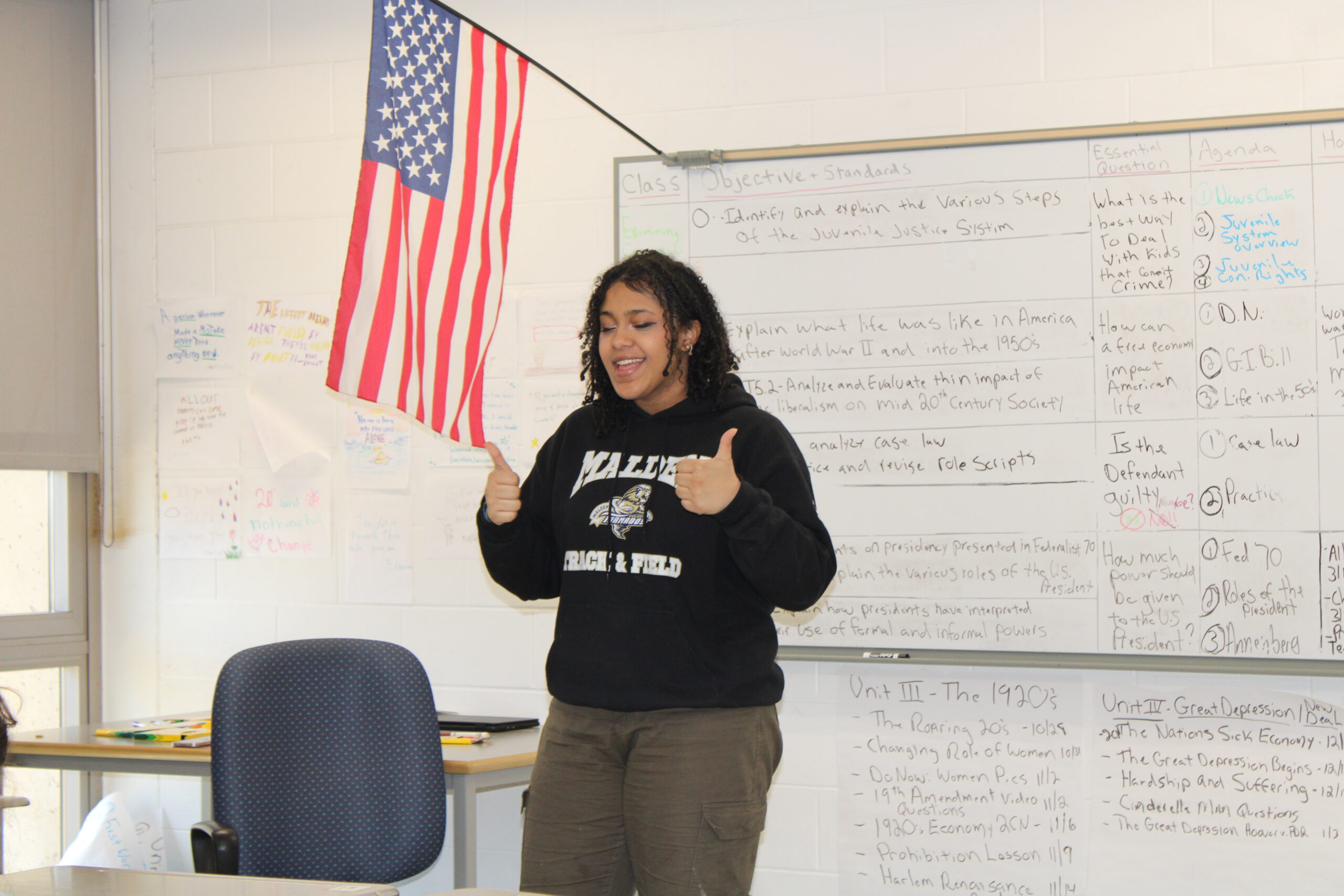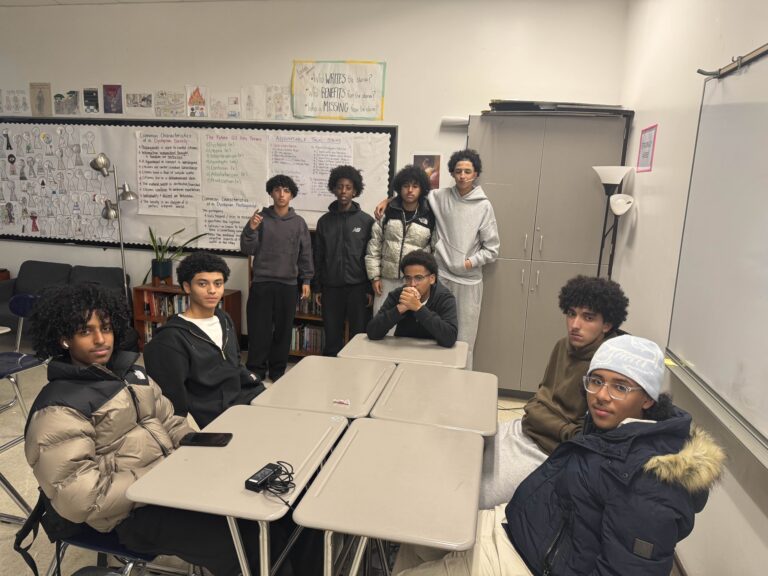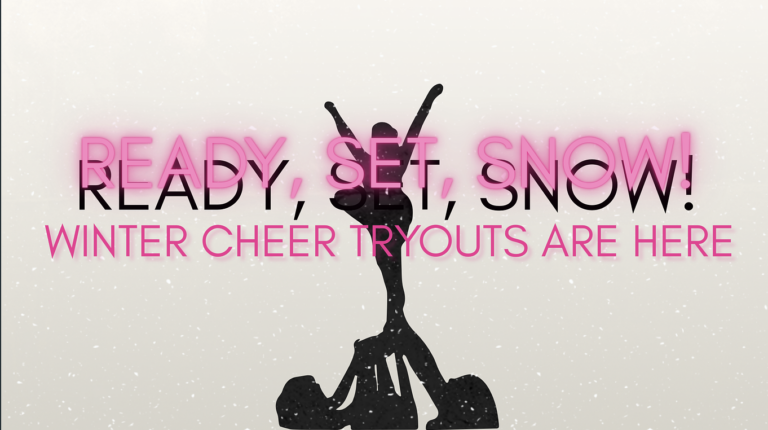
After years of planning and advocating for this establishment, Malden High proudly welcomes to its program of studies what was once a club and is now formally offered as a class: Speech and Debate.
Students will now have the opportunity to significantly improve, and put into practice, their public speaking, argument, and critical thinking skills in a variety of events and tournaments throughout the year.
The club, advised by social studies teacher Kurtis Scheer for the past eight years, has undergone an extensive journey from pre-COVID until now in order to achieve its goal of becoming an official elective.
This goal sprang from a desire to increase time and resources for students to be more successful while competing with schools that may have met more frequently and formally by comparison.
“I always hoped and envisioned that we could eventually go from this club status into a full-fledged class, after going to a number of events over the years and speaking to other advisors,” Scheer explained.
“The process here really took several years of success at the club level,” he continued. In order to attest to its potential, Speech and Debate sought to highlight its success through its consistent numbers as just an after-school club.
“The fact that we’re able to keep the same consistent amount of people who are engaged in it shows that if we had this during the school day, the numbers could potentially be much, much larger,” Scheer stated, emphasizing the importance of providing a dedicated space and consistent routine for students to engage.
Sophomore Beatriz Oliveira who joined the club to improve her public speaking skills, especially for her presentations in another elective, Mock Trial, is excited for the program. “I specifically remember that on the first or second day of advisory, when the teacher asked what club we would want as a class. I said Speech and Debate. I think that having a club as a class helps everyone become a lot more involved since there’s a designated amount of time to meet every week as a part of your grade.”
Aside from its consistent membership, “what ultimately made the shift here was students speaking to the superintendent and emphasizing the fact that they wanted to see this as a class,” Scheer explained.

President Makeila Scott, among those who played a pivotal role in demonstrating student interest, echoed Scheer, saying that “all of our collective efforts are what really led that to happen.”
Scott had spoken to the superintendent and city council members about the club in effort to demonstrate its dedication, commitment, and show “that we are successful—we have had new members that have won awards at their first event. That’s not something light, that is a big accomplishment.” Scott also promoted the course in the Mystic Valley Youth and Government and Mock Trial, encouraging her peers to further develop their speaking skills through the class.
Vice President Arya Shah, who also promoted this establishment, spoke about his efforts. As president of the Malden Youth Civics club, “I used that as a channel to bring up making Speech and Debate a class to the superintendent and principal on a few occasions. Also, as an officer of the club I tried my best to highlight how strong of an opportunity the program is so that the potential it has could be better understood.”
In addition, many alumni of the club “took the same skills and led to great careers at pretty prestigious universities, from Harvard, to Yale, to Columbia, to Providence College… So that was the proof that this could be a viable course,” said Scheer.
The planned curriculum for Speech and Debate will reflect The National Speech and Debate League which puts out information in preparation for the different events, speeches, and performances, which other districts are using now. “So we’re going to utilize this nationally accredited, recognized curriculum for our first year to model what we do in the classroom based on what is seen as national exhibit standards,” Scheer explained.
The club is currently working on its exposition to attract more students during Joy block on March 20, where members will perform events they are experienced with to show new or potential members what will be covered.
“There’s so many different events that you can be a part of and find where you belong,” said Scott.
The club is split up into two categories, as indicated by its name: speech, and debate. Debate events include Student Congress, public forum, and big questions debate, which are generally practiced between students in groups or teams. The other option is speech, which can range from poetry to storytelling.
“I couldn’t be more ecstatic and even that’s an understatement. I’ve heard about the push for this to become a class for so long, that it almost hurts sometimes because I kind of felt helpless being in this role and not really being able to do much. But now seeing the fruits of our labor and all of our members—the officers’ work, past officers, past members—and seeing that our dedication to this club elicits meaningful change, now it’s a class and we’re able to expand it, I’m so excited that it was something that was able to happen and it’s something that I’ve been waiting for for so long,” Scott cheered.
Although a senior and unable to enjoy the class next year, Scott is “more than content knowing that my efforts and dedication to a club have allowed more people the opportunity to join this. So many people have come to me saying that they couldn’t do Speech and Debate: people that have dropped because they have other commitments because they have sports and they have other clubs or they’re the leaders of their own clubs… even though I may be graduating to see that it’s going to have an everlasting impact, this is something, it’s a class now—it’s the future. And I just think that being able to make that happen is what matters. And even though I may miss it, I really don’t feel as though I’m missing it.”
Shah similarly spoke on how impactful this establishment is. “I hope underclassmen understand just how powerful of an opportunity this is. There are so many stories of small Speech and Debate clubs turning into large programs, and even sending kids to nationals. Students can truly get so much out of this and see so much growth in themselves even if they do not consider themselves good speakers,” he concluded.
Scheer recommends the course to “anyone who likes to argue, anyone who thinks they’re always right, anyone [to] who their friends always say, ‘Oh, you’re so dramatic,’ anyone who wants to work on public speaking skills, anybody who will ever have to interview for a job—which is everybody—I think, could take this class and get those skills to make them more competitive in an ever increasingly competitive world.”
With their showcase on March 20 in the gallery, be on the lookout to see Speech and Debate members present what the course entails.




